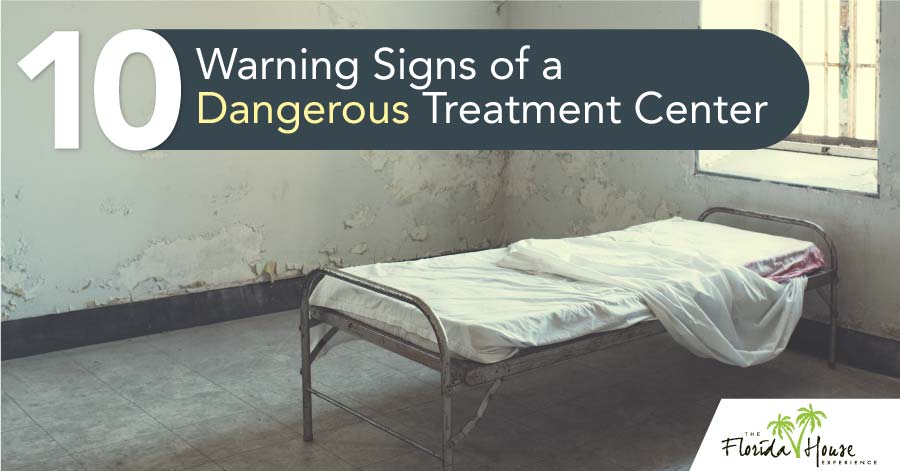
When it comes to finding the right addiction treatment center, there’s a lot to consider. Not only do you need to think about the kind of help you need and the location that works best for you, but you also need to know that there are a number of dangerous substance abuse centers out there.
Here are the top 10 red flags you need to be aware of when looking for a drug and alcohol treatment center:
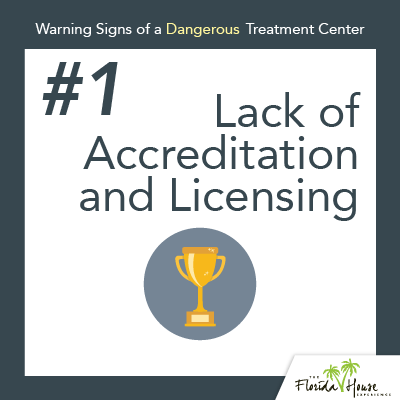 1. Lack of Accreditation and Licensing
1. Lack of Accreditation and Licensing
While there are currently no national standards for drug and alcohol treatment centers in the United States, that doesn’t mean that rehab facilities aren’t regulated.
Here in Florida, any service providers who offer substance abuse services, including inpatient treatment, are required by law to be licensed through the Florida Department of Children and Families. Unfortunately, these standards only cover the basics like facility safety, and worse yet, a number of states don’t even have licensing programs in place for drug treatment centers.
High-quality rehab centers always take part in voluntary, third-party quality and safety standard reviews, such as accreditation through an international non-profit organization such as CARF.
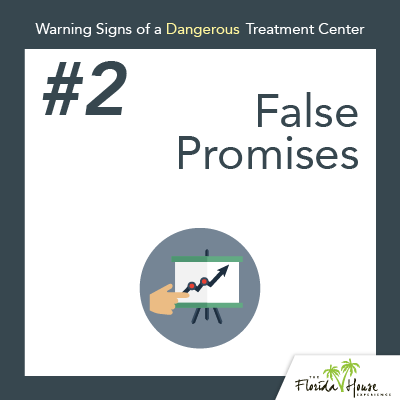 2. False Promises
2. False Promises
If a treatment center promises to “cure” you of your substance abuse problem, that’s a huge red flag.
While credible rehab facilities often track patient outcomes and can provide this information, the fact is that addiction isn’t something that can be cured, and individual treatment centers simply can’t make promises about treatment outcomes.
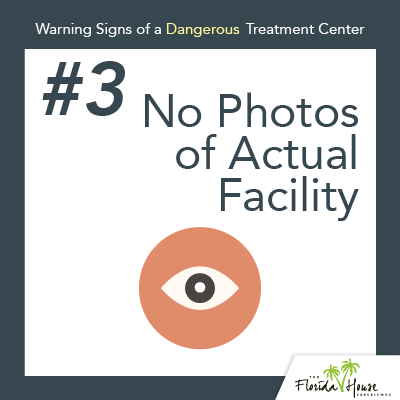 3. No Photos of the Actual Facility
3. No Photos of the Actual Facility
Unfortunately, there are some unscrupulous operators out there who try to lure in clients by giving a false impression of what is offered. One of the more common forms of deception is failing to use actual photos of the rehab facility on the company website and in their advertising materials.
Although some rehab companies try to claim that they don’t post photos of the facility in order to protect patient confidentiality by concealing the actual location of the center, the fact is that as a prospective client, you need to be able to see pictures of the place where you could be living for weeks or even months.
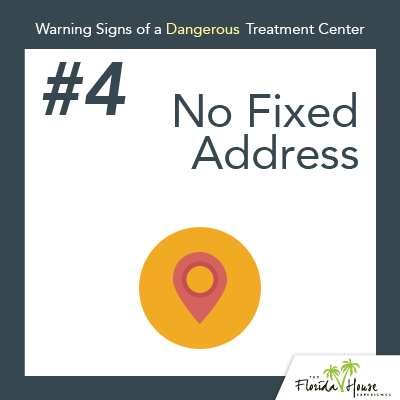 4. No Fixed Address
4. No Fixed Address
Another common scam that’s used to lure vulnerable addicts into signing up for a drug and alcohol treatment center that’s dangerous is a lack of a real, physical address for the facility on the website. These days, anyone with a computer and a bit of technical savvy can put together an impressive website that can look and feel like one for a real addiction facility.
If you can’t find a street address listed on the website, chances are good the website is little more than a “bait site” that’s used to generate leads for other locations, or worse yet, simply scam you out of your money altogether.
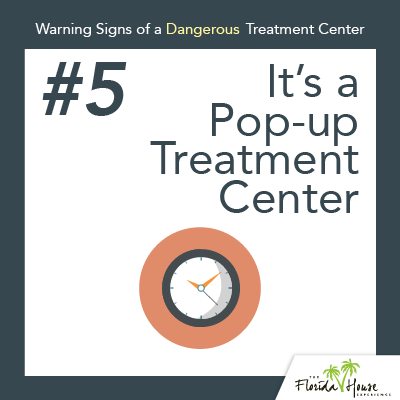 5. It’s a Pop-Up Treatment Center
5. It’s a Pop-Up Treatment Center
Substance abuse treatment is serious business, but despite this, some well-intentioned people are trying to create “pop-up” treatment centers that operate out of summer camps, resorts and retreat centers.
While there’s nothing wrong with attending a retreat, week-long camp or other experience that’s geared towards sober living, the fact is that treatment centers aren’t something that can be plunked down in a temporary location.
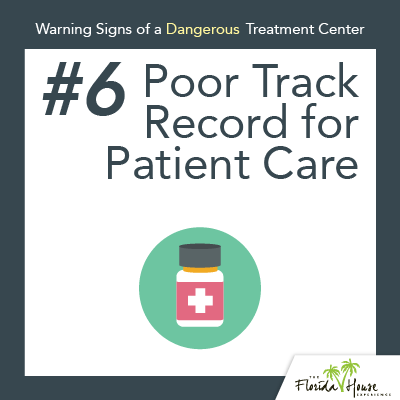 6. They Have A Poor Track Record When It Comes To Inpatient Deaths
6. They Have A Poor Track Record When It Comes To Inpatient Deaths
According to the federal Substance Abuse and Mental Health Services Administration, in 2015 over 1.4 million Americans accessed drug and alcohol treatment at either an inpatient, outpatient or residential treatment program in the U.S. — and 3,362 of those people died while in treatment.
Before you check into a treatment center, take the time to do an online search to see if you can find any stats about deaths at the facility, or better yet, ask the intake counselors to give you that information. If they refuse, consider that to be a sign that there have been some serious issues at the center.
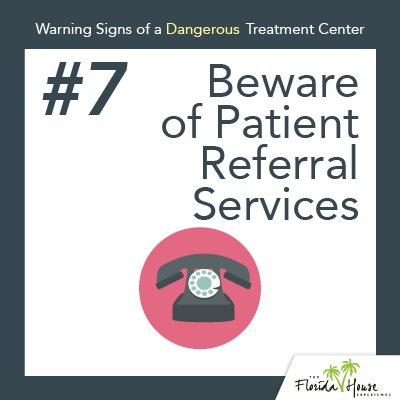 7. Beware of Patient Referral Services
7. Beware of Patient Referral Services
Rehabilitation for drug and alcohol abuse is a multibillion dollar industry in the United States, and much of that money comes from insurance companies. In an effort to capitalize on the ever-growing demand for addiction services, some treatment centers are paying patient recruiters to find referrals for them. This means that you may think you’re agreeing to attend one program and wind up actually enrolling in a completely different facility that has bid on your referral — a process known as “patient brokering.”
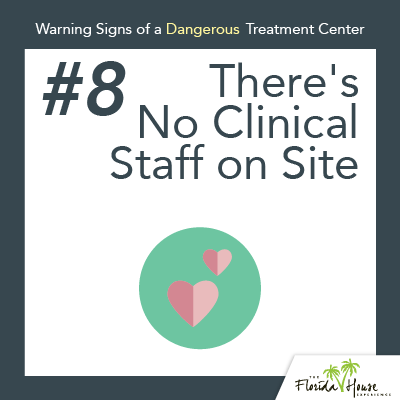 8. There’s No Clinical Staff on Site
8. There’s No Clinical Staff on Site
Ask about the clinical staff of the facility you’re considering — what is their education, experience and professional reputation like? Do they work full-time at the addiction center, or can you find their name associated with a number of different clinics and detox facilities?
While it’s common for addictions medicine specialists to be affiliated with more than one hospital or treatment facility, it’s also important that they aren’t stretched too thin. Otherwise, patient safety can be put at risk.
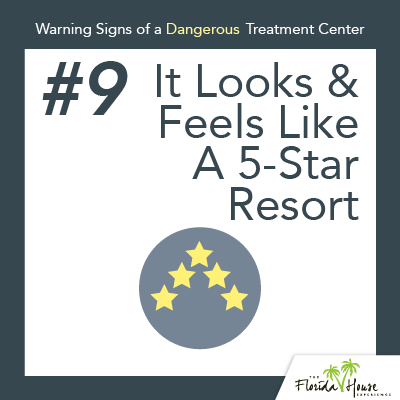 9. It Looks and Feels Like A 5-Star Resort
9. It Looks and Feels Like A 5-Star Resort
Having a nice, pleasant and well-appointed rehab facility is great — as long as there’s still a focus on quality treatment and addiction services. In some cases, addiction centers have become mini-resorts where clients have little to no accountability, support or structure — all things that are critical when dealing with addiction and mental health issues.
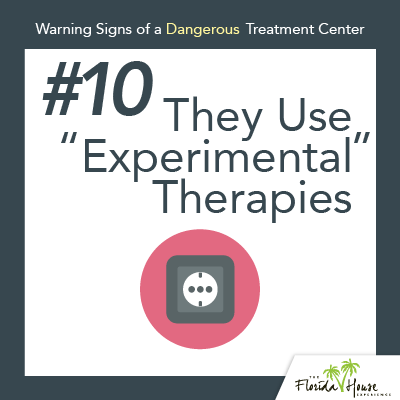 10. They Use “Experimental” Therapies
10. They Use “Experimental” Therapies
For most people, signing up for a substance abuse program is a life-and-death issue — this isn’t the time to deal with unproven techniques and new-age therapies. If a treatment center can’t clearly describe the methods they use to design their programs, their treatment philosophies and evidence behind their services, steer clear.
Need Help? We’re Here For You
When you need help dealing with a drug or alcohol addiction, call us here at FHE. We’re a fully licensed and CARF-accredited facility that’s committed to quality care for people dealing with addiction and mental health issues.






